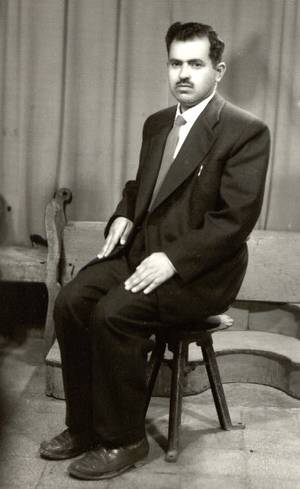
Abdullah-Afandi عبدوالله افندي
They lived in a small town. A family you might call big today. They had already five sons. Later when they moved another son was born and a seventh was a miscarriage. “I buried it in our little front garden early in the morning” his wife told one of her sons while tears were running down her cheeks. His father died when he was a child and his mother married again for a woman couldn’t live alone as a widow in their culture. What people said weighed heavily and people gossiped. Widows had a hard life and people looked askance at them. They were either thought not worthy of a new partnership or had to live with a member of their family since they couldn’t survive alone. Their family usually accommodated them for a short time but just like fish which goes off after three days they were either thrown out or rushed into a new marriage willy nilly.
A stranger, who was shot in his leg as a result of blood vendetta, fled there and started his own tailoring business. When he was about five or six, this stranger proposed to his mother. Later his mother gave birth to two sons and a daughter. His step-father, the tailor with the wounded leg was according to their custom an uncle to him. But he played gooseberry or what you might call a fifth wheel in a car because he was from a different father. His half-sister often said: No, my brother! What makes him my brother? His eldest half-brother who neither got married nor could find a job was often bad-tempered and reacted aggressively whenever he tried to speak with him. This half-brother was also addicted to drinking in the evenings. He used to drink until he fell asleep. Later he bought a second hand-car and earned his living by driving passengers to a big city about 200 km away. There were other people offering the same service and he was often fleeced.
He was one of the first primary school teachers in his little town and as soon as he was appointed he got married according to their custom. The marriage contract read: I, the teacher, take you, Mistress, daughter and eye apple of an honourable family, the young sensible, obedient, bashful and undefiled girl as my wife…. This way he did better than his half-brothers and half-sister. His uncle, the stranger with the wounded leg was not pleased but he kept in touch with him.
In his little town everybody had a nickname used by others derogatorily. People stigmatized him as the nasaler or nomantic nascal because they thought he spoke through his nose. This nickname created a big psychological problem for him and he often reacted very sensitively when people used it in anger. Once while he was talking at home he noticed that he indeed turned an R into an N. He laughed and looked at one of his sons who was standing next to him. His son looked seriously at him and did as if he didn't hear it. Thus, he was convinced he was a nasaler. He even thought that some people had better respiratory organs than him, so he stopped smoking. He was attacked one day by one of his wife's relatives who played cards with him and drank alcohol. When his relative was drunk he started calling him the nasaler in a loud voice in front of all the people who gathered around and stopped the two from hitting each other. He then sat in a car which was supposed to take him back home with his family and kept saying: He didn’t drink on my account. The next day his half-brother went near the relative and shouted angrily: He who calls my brother the nasaler is son of a bitch.
Jamshid
Bremen, 9 December 2007
Comments
1. Women: just imagine a woman is married and has five or six children but all of a sudden her husband dies or is divorced. She is left alone without any financial basis. This means she is left to the mercy of her family. In case of divorce her children might even be taken away but she will be left to the wolves (she is then like game given free for hunting). Her family might accommodate her but as you know you simply can’t have even your sister living with you for a long time. A proverb says: guests and fish stink after three days. The result is she is persuaded to accept anybody who proposes to her. You are totally right Devil's tear when you say: I will then be proud of being a bitch.
2. Family issues and half-brothers and sisters: When a mother marries again her daughter or son from the previous marriage might be discriminated against.
3. Usually men but sometimes women too: Nicknames are given to them relating to some prominent feature or slip. Names are given for example when people lisp, speak through their nose, effeminate males are referred to as pussy and so on. Such practices create psychological problems for the people concerned.
4. Marriage Contracts: I wanted to translate one literally. It gives you more insight into the practices. I will do one in more detail later.
Golden fingers you have man. This story has penetrated my arteries very deeply. I'm not sure if I understood it very well. I've read it a lot yesterday and today. It's hard to understand. especially the last part.
I know you suffered a lot to be raised without a father and be socially the odd one out but when I look back and see you were one of the first primary school teachers in Rawanduz known as "Abullah Afandi" (a title only given to eduacted and literate people) I know you had all reason to be proud of yourself. What you needed was a litle bit of self-confidence to stay true to your principles and get rid of your fickleness. You might have accepted your weaknesses but your ruthless society demanded from a man only strength.
Abduallh Afandi in his best picture (hung on the wall in the living room) as a primary school teacher.
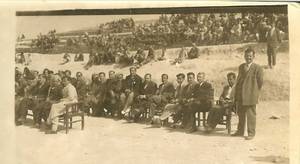
Abdullah Afandi standing at a festival in Gargadard - Rawanduz
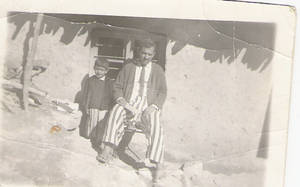
Abdullah Afandi in the afternoon after work in Rawanduz with his son Pishtiwan. Sitting in front of the kitchen window and as usaul he is in his pajama trousers but still wearing a cardigan and a tie.
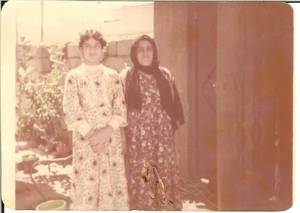
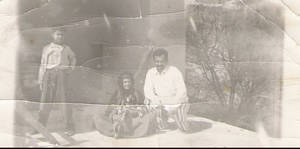
Last Picture shows: Abdullah Afandi with his mother Nana Asi and his two Sons: Salam and the baby Kamaran in Rawanduz. The picture before the last shows: Abdullah Afandi's half-sister Haysh and her daughter in Mosul
